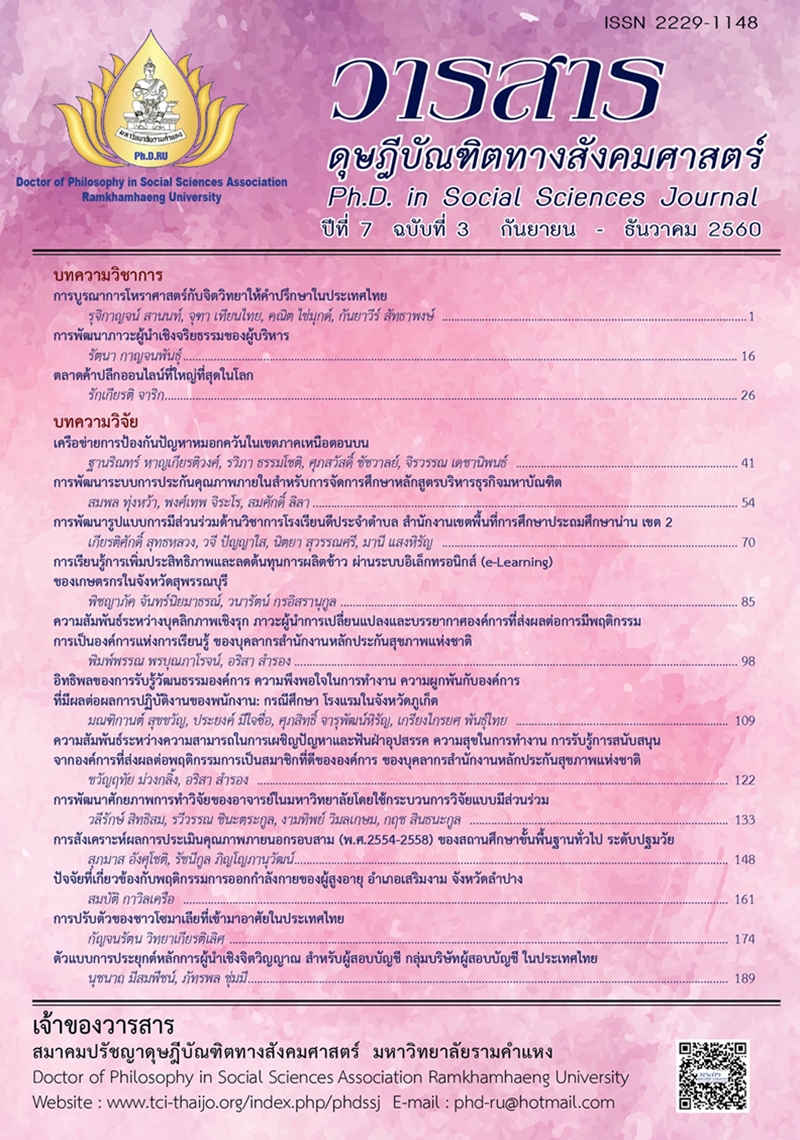เครือข่ายการป้องกันปัญหาหมอกควันในเขตภาคเหนือตอนบน
Main Article Content
Abstract
การวิจัย มีวัตถุประสงค์ คือ (1) เพื่อศึกษาปัจจัยและเงื่อนไขในการเกิดเครือข่ายการป้องกันปัญหาหมอกควันในเขตภาคเหนือตอนบน (2) เพื่อศึกษาเครือข่ายการป้องกันปัญหาหมอกควันในเขตภาคเหนือตอนบน (3) เพื่อศึกษาการบริหารจัดการเครือข่ายการป้องกันปัญหาหมอกควันในเขตภาคเหนือตอนบน
สรุปผลการวิจัย ดังนี้
1. ปัจจัยและเงื่อนไขในการเกิดเครือข่าย ได้แก่ (1) ลักษณะทางกายภาพและสิ่งแวดล้อมชุมชน ตั้งอยู่ในพื้นที่นอกชุมชนเมือง (2) โครงสร้างทางสังคม มีกลุ่มในพื้นที่จำนวนน้อย แบบแผนพฤติกรรมของชุมชน คือ เป็นแบบเครือญาติ เคารพผู้อาวุโส เคารพผู้นำ มีอาชีพทางการเกษตร เน้นความสัมพันธ์ส่วนตัว (3) ระบบทางสังคม เป็นครอบครัวขยาย นับถือศาสนาคริสต์เป็นหลัก โดยเฉลี่ยจบการศึกษายังไม่สูงมาก ปกครองกันเองในหมู่บ้าน รายได้หลักจากอาชีพด้านการเกษตร และ (4) ทุนทางสังคมมีองค์ประกอบครบทุกด้าน คือ ผู้นำ สถาบัน ภูมิปัญญา วัฒนธรรมประเพณี และทรัพยากรธรรมชาติและสิ่งแวดล้อม
2. เครือข่ายและปฏิสัมพันธ์ในเครือข่าย ผู้ที่มีส่วนร่วม ได้แก่ หน่วยงานราชการส่วนส่วนกลาง ส่วนภูมิภาคและส่วนท้องถิ่น ภาคเอกชน และประชาชนในพื้นที่ ปฏิสัมพันธ์ภายในเครือข่าย พบว่า รูปแบบความสัมพันธ์ไม่เป็นทางการมากกว่าความสัมพันธ์ในรูปแบบที่เป็นทางการ
3. การบริหารจัดการในเครือข่าย พบว่า มีภาวะผู้นำ ในระดับหมู่บ้าน มีระบบการตัดสินใจแบบประชาคมในหมู่บ้าน มีการจูงใจแบบให้ค่าตอบแทน มีช่องทางการสื่อสารแบบเป็นทางการและไม่เป็นทางการเฉพาะในหมู่บ้าน
NETWORKS FOR PREVENTING THE PROBLEM OF HAZE IN THE UPPER NORTHERN REGION
In this dissertation, the researcher studies (1) the operational problems of networks engaged in preventing the problem of haze in the upper northern region. (2) factors and conditions governing existing networks. (3) networks and their management.
Findings are as follows:
1. Factors and conditions governing existing networks were as follows: (1) Insofar as concerns physical characteristics and community environment, it was found in rural communities. (2) Regarding social structures, it was found that networking communities were confined to small areas with community behavior patterns showing a familial pattern with respect being paid to elders and leaders. (3) In respect to the social system, they belonged to extended families. Christianity was the dominant religion. On average, they had not received higher education. They were self-governing villagers whose major income was derived from agriculture. and (4) Concerning the components of social capital, all aspects were found, viz., leadership, institutions, wisdom, culture, traditions, natural resources, and the environment.
2. The management of networks: Participants were central, regional, and local government entities, the private sector, and local residents. Insofar as concerns network interactions, it was found that the patterns of relationships were informal rather than formal.
3. Regarding network management, it was found that there was leadership at the village level. The decision-making system as communitarian at the village level. Motivation was induced by conferring rewards. Intra-village channels were both formal and informal.
Article Details
Academic articles, research articles, and book reviews in the Ph.D. in Social Sciences Journal are author’s opinions, and not the publisher’s, and is not the responsibility of the Ph.D. in Social Sciences Journal Philosophy Association, Ramkhamhaeng University. (In the case that research is done on human, the researcher has to be trained in Ethics for Doing Research on Human Training and has to produce the evidence of the training).


